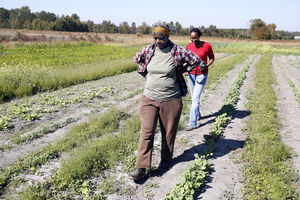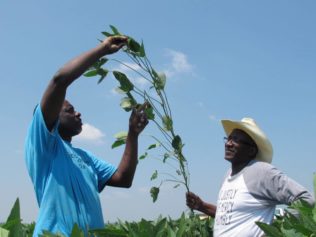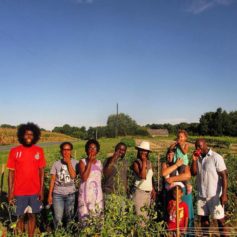At a time when many African-American farmers across the country are struggling to hold onto their livelihood, initiatives in South Carolina may have found a way to help ease their burden.
One program, called the Farm to Food Bank, manages to help the farmers and the homeless and hungry at the same time.
Farm to Food Bank helps farmers sell their crops to the Harvest Hope Food Bank, which provided 28 million pounds of food to more than 2.2 million hungry South Carolinians last year through its four locations.
Farm to Food Bank enabled African-American farmer Jannie Dickson, who started Dickson’s Organics Farm in 2006 when she grew tired of her desk job in the city, to ship her organic kale to Harvest Hope Food Bank.
Dickson also has worked with the Community Supported Agriculture, a movement that shortens the gap between the producers and the consumer. Consumers who join the CSA agree to buy directly from the farmer, incrementally, for a season. This kind of relationship ensures that the farmer receives payment early in the season, receives better prices for crops and spends more time farming than marketing.
Consumers benefit, too, because they know where the food originates and can get it extremely fresh.
“I would love to just market everything through CSAs,” Dickson told scnow.com.
The Storytelling Project is a very different kind of initiative in South Carolina. It focuses on interviewing African-American farmers to record the history of African-American agriculture and educate students. The project is an initiative started by the South Carolina-based Family Agriculture Resource Management Services (FARMS), which focuses on issues such as land loss facing African-American and Native American farmers.
Attorney Jillian Hishaw of FARMS works closely with farmers to help them hold onto their lands. She also records their stories for the Storytelling Project. On a recent afternoon, she was following Dickson around her land, recording her every word, according to scnow.com.
“African-Americans lose about 30,000 acres of land a month,” Hishaw told scnow.com. “And that’s just in the southeast region of the United States.”
After African-American farmers sued the federal government in the 1990s, alleging the Dept. of Agriculture discriminated against Black farmers in the distribution of farm loans, on February 18, 2010, they were rewarded with the largest civil rights settlement in U.S. history: $1.25 billion.


